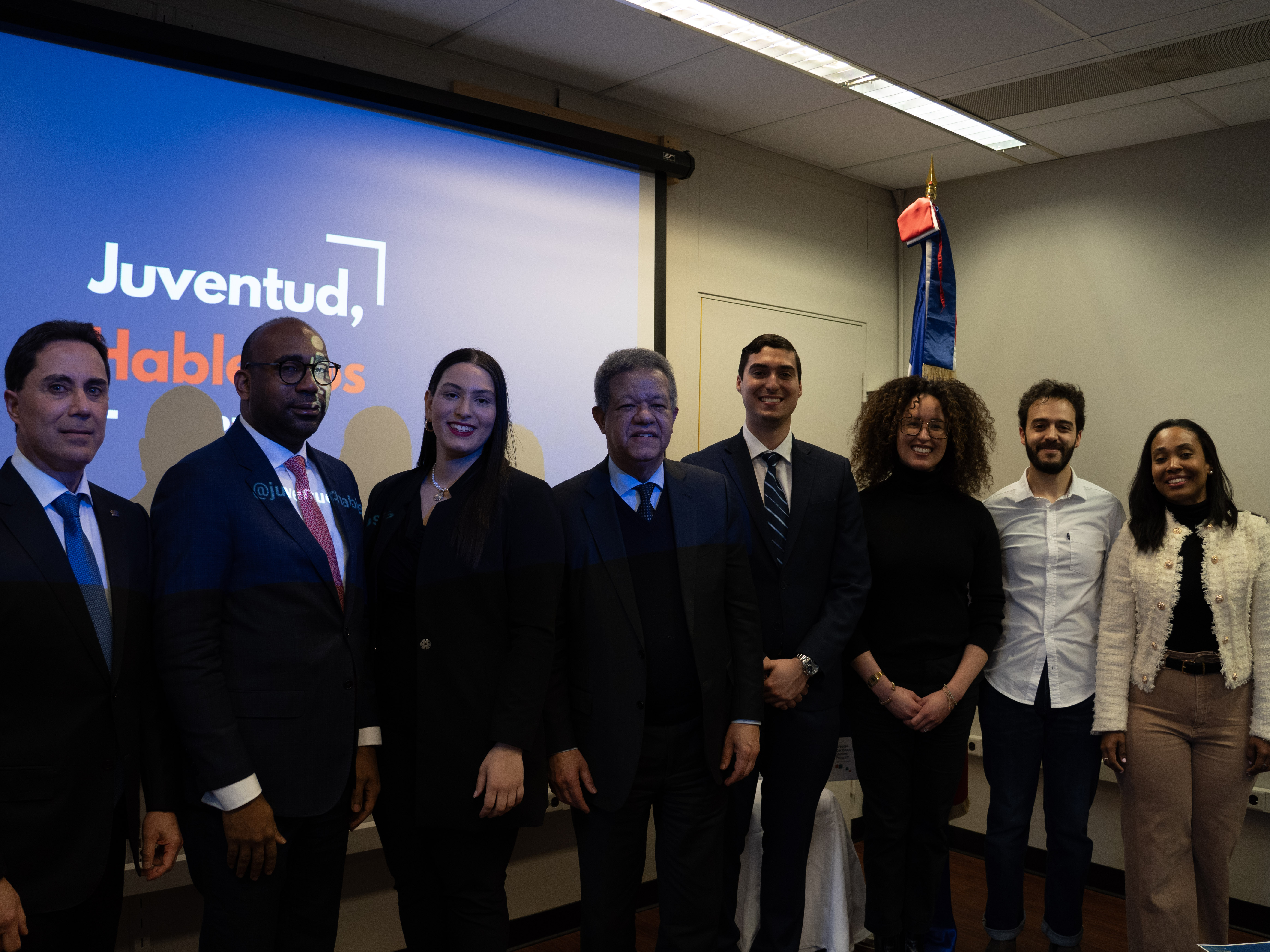Conclusions of the National Inter-Ministerial Dialogue on Climate Change
 | Conclusions of the National Inter-Ministerial Dialogue on Climate Change The National Inter-Ministerial Dialogue on Climate Change, held on 2-4 September 2009 in Santo Domingo, the Dominican Republic, was organized by the Ministry of the Environment and Natural Resources and the National Council on Climate Change and Clean Development Mechanism under sponsorship of the United Nations Development Program. Nearly 175 ministerial representatives and officials from parliament and regional governments participated, as well as representatives from public institutions including Civil Defense, the National Meteorology Office, national water authorities, the central bank, as well as private banks, industrial associations, nongovernmental organizations, academic institutions, research institutions, and the private sector. Representatives from international technical cooperation agencies also participated. The inter-ministerial dialogue is the first phase of the project in the Dominican Republic, which seeks to create a national dialogue on how to determine a comprehensive plan in the main sectors and ministries and discuss the national priorities to address CC. These discussions were part of the “Capacity Development for Policy Makers” project sponsored by the UNDP’s Environment and Energy Group, which has the following objectives: to estimate the level of investment necessary to address climate change (CC) in key sectors; provide results for international negotiations on climate change and help develop policies and measures to address climate change in key sectors. The inter-ministerial dialogue is the first phase of the project in the Dominican Republic, which seeks to create a national dialogue on how to determine a comprehensive plan in the main sectors and ministries and discuss the national priorities to address CC. This dialogue serves as a framework to initiate the project’s works. During the dialogue, topics included long-term governance and comprehensive planning on CC, and examined issues in the progress in international agreements on CC, in particular the pillars of the Bali Action Plan. Also, issues were discussed on the evaluation of the flows of investment and financing to achieve mitigation in the energy sector and adaptation to CC in the tourism and water sectors. SUMMARY OF CONCLUSIONS AND RECOMMENDATIONS General: Promote a comprehensive national vision for society to address the challenge of climate change. ENERGY SECTOR: Four types of obstacles were identified to the implementation of mitigation in the energy sector: TOURISM SECTOR The tourism sector is the most important and dynamic sector in the nation’s economy; it accounts for 8-9% of fiscal revenues and is the country’s main provider of foreign exchange. The tourism sector and climate change are closely related. The sector contributes to the causes of climate change and is in turn affected by its effects. The effects of climate change on the sector can be seen in three areas: impacts on the natural environment (the main resource in the tourist sector), the impacts of tourism infrastructure (which provides the supply), and the impact on human lives (of those who create the demand). It is essential to implement measures adapted to climate change in the tourist sector. There is a clear lack of awareness and civic education on environment issues and climate change. It is thus necessary to implement transversal educational programs that prevent corrupt attitudes, including the environment, the adaptation to climate change, and the prevention of disasters from an early age. Keeping in mind that tourism is the most important economic sector in the Dominican Republic (in terms of GDP contribution and generating employment), social development should be incorporated as part of the objectives. Local residents should be integrated into sustainable tourism management, and there should be greater promotion of domestic tourism and facilitation of access to land on the part of local populations. Several eco-tourist examples include Jarabacoa, Samana, Monte Plata, Barahona and other places, and they serve as role models to be implemented throughout the country. Land use planning is a key factor. Identified obstacles include the lack of clear property registration leading to projects being sited in vulnerable zones, as well as the need for a national land use and tourism plan, which emphasizes the management and protection of coastal ecosystems impacted by climate change. Areas for tourist vocation should be defined, as well as the type of investment necessary to promote sustainable tourism development. Enforcement of Law 64-00 should be ensured, on protection of the coastal border that prohibits the private use or building within 60 meters of the shoreline, and monitor the free public access to beaches is respected. Also, a policy should be adopted on hotel construction far from the areas of risk of flooding and review the land use plans in existing projects. In the Dominican Republic entrepreneurial commitment and responsibility should be promoted. One identified obstacle is the runaway profit of businesses in the tourist sector, as well as the culture of exploitation and poor use of natural resources. Research and technology also play an important role in the success of sustainable tourism, taking into consideration the environmental impacts of the sector and the effects that climate change will cause. It is proposed that research policies be established that serve as a base for the CC-adaptive measures, and to establish joint efforts between the ministries and the academic sector to promote research on tourism and climate change, implement early warning systems, bioclimatic and sustainable architecture and design in hotel infrastructure, as well as adaptive technologies such as breakwaters or dikes to protect coral reefs, implementing beach-regeneration models, among other things. It is also important to use an interdisciplinary and eco-systemic focus in the studies and to formulate adaptive measures. Finally the need was identified for financing and incentives to implement policies and measures. Several proposals were made: to establish a mechanism to channel funds from investors in the areas of tourism, in order to improve water quality in these zones; promote the work in conjunction with the populations in the upper geographical regions with the lower regions in the areas of influence in the tourist beaches (the existence of the General Law on Water was mentioned in which incentives are established for programs in sanitation, watershed management and reforestation); earmark part of the funds from the 5% tax on charter flights, to adapting to climate change (as a counterpart to international funds); create strategic public/private/community and NGO alliances to motivate actions for protection of local environments in tourist zones and that generate sources of income for communities; create a national insurance in case of disasters; and incorporate the environmental component and specifically adaptation of the sector to climate change and the existing law of incentives for tourism (Law 158-01), applied by CONFOTUR. WATER SECTOR: Climate change is producing significant changes in the availability of water resources for human consumption and productive activities as compared to historic conditions, which exacerbates the conflicts for water use and distribution. The increasing frequency of extreme hydrological events, where droughts and floods are the most evident severe consequences, present threats for human lives and health, productive activities, and preservation of ecosystems. The decrease in vulnerability of these consequences is a result of the implementation of policies on legal matters that attempt a comprehensive evaluation and updating of the existing regulatory framework on water resource issues, which favor the development of actions in the institutional context of policy-making, research, technology and education. In this context, it is recommended that the skills for the different administrative posts concerned with water resources be defined and inter-institutional coordination in watershed management be strengthened. These should be included in water management plans, developing comprehensive plans that encompass, among other aspects, reforestation, crops in controlled environments, reduction of crops with excessive water needs, the development of comprehensive sanitation programs and payment for environmental services. Also presented as a complementary measure at the watershed level were the needs to increase surface water reserves through maintenance/repair of existing dams and to develop new opportunities. Another important aspect in water management in terms of climate change is the implementation of plans to mitigate the impact of hydrological emergencies and improvements in recording, compiling and disseminating data on water resources for widespread public information. In the area of education, reallocation of financial resources is recommended to help develop comprehensive programs and educational campaigns to train human resources specialized in water resource management. In this context, one priority identified was the development and strengthening of awareness and education in water conservation issues, include the field in the formal education system, and design and conduct awareness campaigns and environmental education. In terms of water collection, distribution and consumption, it is suggested that research policies be implemented to expand the availability of sources of storing, decentralizing the process of distribution in order to favor greater access to water, as well as regulation of the use of water as a measure to preserve the resource in the future. One significant obstacle to implementation of these measures is the existence of a culture that favors the poor use and abuse of the resource of water, damaging water supply and quality, both surface and ground. This cultural barrier is associated with a lack of awareness on the value of water, as well as a lack of information that leads to non-compliance with the prevailing norms and regulations on extraction and use of the resource. The existence of inadequate control policies favoring the irrational use of the resource is also mentioned, as well as the lack of a general regulatory framework that controls the sectors of drinking water and sewerage. There is also a lack of urban planning in water supply and design of sanitary systems, as seen in Santo Domingo and other large cities in the country. The quality of the resource is affected by the lack of control of the management of solid waste and residual waters, both industrial and domestic, as well as the uncontrolled use of pesticides and insecticides in agriculture. In this framework is included a lack of maintenance of the existing structure that leads to losses and pollution from ruptured pipes. On the issue of soil use, one significant obstacle is excessive economic dependence on and consumption of crops with high water demand, the lack of greenhouse production and new technologies that promote efficient use of the resource, and the use of faulty irrigation techniques. On institutional issues, the lack of agreements among institutions involved in water management was noted, as well as the lack of political will to improve the quality of service through adequate investment. Other aspects noted were the lack of control in enforcing the current laws and regulations, and the scattered institutional roles on management and control of the resource. The following points were made as promotional measures to provide incentives to facilitate application of the adaptive measures: improve the dissemination of current incentives; transform the payment of incentives for environmental services from isolated projects to national programs; purchase and reuse waste from communities that dispose of it in rivers and streams; provide tax breaks for individuals who install treatment plants to recycle gray water. The need was also mentioned to provide facilities to those education and research institutions that promote programs to optimize water resource management; promote incentives for research; incentives to optimize and increase the use of appropriate technology for conservation and use of the resource; penalize the over-exploitation of ground water and ecological certification of rational use of the resource. Finally, the participants expressed their thanks for the opportunity to participate in the exchange of ideas and the frank debate on the subject, and they think it would be good to continue implementing the project begun with this dialogue, and to monitor the process and hold future meetings on the subject. They also emphasized converting the challenge presented by climate change into a new opportunity for development.
| |
| Date of Publication: September 6, 2009 |

Related News
-

(Versión en español) MINC realiza el evento "Enamórate del Arte y la Cultura" en Los Alcarrizos
-

(Versión en español) InspireDR celebra una década de impacto con “La Fiesta 10” en Cabarete
-

(Versión en español) Organización “Juventud Hablemos” de la Universidad de Columbia y la GFDD copatrocinan a casa llena evento sobre “La evolución de la democracia en la República Dominicana”
-

(Versión en español) Realizan premiere del documental “El Padrino II: 50 años y su filmación en República Dominicana”
-

Actividad #1
Dónde:: Complejo Acuático Del Centro Olímpico Juan Pablo Duarte.
Días: 28 y 29 de noviembre 2016.
Precios: RD$1,1000.00 VIP, RD$600.00 gradas.


